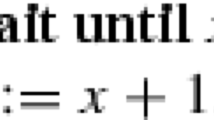Summary.
Concurrent systems in which there is a known upper bound Δ on memory access time are considered. Two prototypical synchronization problems, mutual exclusion and consensus, are studied, and solutions that have constant (i.e. independent of Δ and the total number of processes) time complexity in the absence of contention are presented. For mutual exclusion, in the absence of contention, a process needs only five accesses to the shared memory to enter its critical section, and in the presence of contention, the winning process may need to delay itself for 4 ⋅ Δ time units. For consensus, in absence of contention, a process decides after four accesses to the shared memory, and in the presence of contention, it may need to delay itself for Δ time units.
Similar content being viewed by others
Author information
Authors and Affiliations
Additional information
Received: July 1993/Accepted: February 1996
Rights and permissions
About this article
Cite this article
Alur, R., Taubenfeld, G. Fast timing-based algorithms. Distrib Comput 10, 1–10 (1996). https://doi.org/10.1007/s004460050020
Issue Date:
DOI: https://doi.org/10.1007/s004460050020




